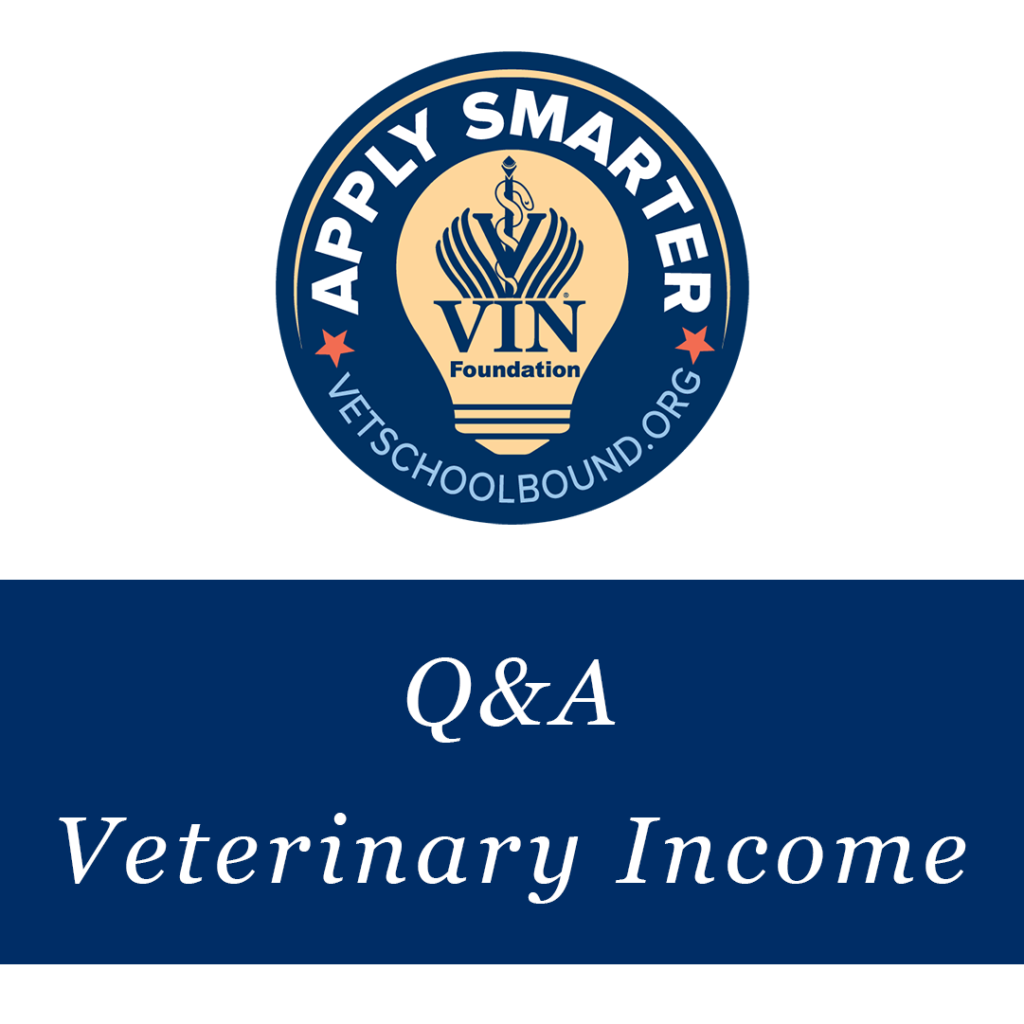Here are some questions and detailed answers about Veterinary Income asked during the Apply Smarter webinars. We also covered questions and answers about veterinary school application and veterinary student loans.
“I’ve heard that it is very tough to have a job while attending vet school? Is it because the program is intense?”
Yes, the curriculum alone is more demanding on your schedule than most full-time jobs. Most veterinary school curricula require 18-20+ credit hours per semester. A rule of thumb is that you should be spending 2 hours studying outside of class per credit hour per week. That would be the equivalent 36-40 hours studying in addition to your classroom time each week.
The reality is you will have a limited amount of time for many experiences (paid or otherwise) outside the lecture hall: spending time in the clinic, joining clubs, personal hobbies, jobs, studying, etc. Some students find jobs that combine some of those experiences as a way to not miss out on either — for example, you might be able to earn a bit of extra income while also solidifying core veterinary concepts by working as an assistant in the school’s clinic.
“How does the type of animals you treat (small/large/exotic) factor into how much money you’ll make a year in veterinary medicine?”
“What is the difference between starting salary and earning potential 5, 10, 20, or 30 years into your career?”
Type of practice, experience, and location are major factors in a veterinarian’s income.
To learn more, use the AVMA Veterinary Salary Estimator for New Veterinarians. You can input practice type, years of experience, geographical area of practice to see ranges of income.
For data beyond the first several years, review the 2019 AVMA Report on ECONOMIC STATE OF THE VETERINARY PROFESSION. This report contains some graphs for various veterinary practice types and years of experience. Since you can’t access the report online until you’re a student AVMA member (or you know a veterinarian who is an AVMA member), you can often access these reports through a veterinary school library.
“If salary doesn’t really make a difference on which school you come from, what is the benefit of attending a higher ranked school?”
This is exactly what “Apply Smarter” is all about. There is currently no data to show that your earnings or career options are correlated to the veterinary school you attend. Your post-veterinary school income opportunities will be determined by your interests, the type of practice you pursue, your experience, and geographical practice area.
Don’t read too much into school rankings. Any student who graduates from an accredited veterinary institution and passes the required licensing exam can practice in their desired field and earn the market rate for veterinary services in that field. There is no “Harvard Effect” in veterinary medicine.
Since you can’t expect to earn a premium for a more expensive veterinary education, Apply Smarter and focus your application on those schools where you can pay the least, especially if you will be using student loans to finance your education.
“Is residency and interning required? If not, what are the benefits of doing so?“
Internships and/or residencies are not required in veterinary medicine. In fact, most veterinary school graduates do not do internships and residencies. You can see statistics on most veterinary internships and residencies through the Veterinary Internship and Residency Matching Program (VIRMP) as well as the AAVMC summary of findings for internships and residencies. There are a number of reasons to do an internship after graduation, but for most an internship is a stepping stone to a specialty residency.
Internship(s) are typically the most direct path to a residency. Residencies train you to specialize in a particular field of veterinary medicine. For example, a board certified veterinary surgeon might do a general internship after veterinary school, followed by a surgical internship, then a surgical residency. After meeting the residency requirements and passing the board exam,they will be a board certified Diplomate of the American College of Veterinary Surgeons.
Board certification generally results in increased earnings. However, how much you earn will be highly dependent on your specialty and location.
“You mentioned no “Harvard effect” for starting salaries; is there one for getting internships/residencies?”
I am not aware of any data showing veterinary school choice impacts internship/residency opportunities.
I would love to see someone analyze board specialized veterinarians, to see if there is a correlation among school, internships, and residency programs and board certification. Hopefully someone will take us up on that or let us know if this has been done already 🙂
“Do the average salaries discussed during the Apply Smarter webinar include internships?”
No. Most references to veterinary salaries exclude internships or residencies because those are low paying relative to clinical practice.
For example, the average income for 2019 veterinary graduates excluding those who did internships or residencies was about $85,000/year. The average income for the 2019 veterinary graduates who opted for internships/residencies wass $35,000/year.
“How easy is it to get a job as a new grad to have room to negotiate salary?”
“The Carribean schools have the highest debt-to-income ratio, is it true it is even harder to find a job after graduating from a school such as Ross?”
Currently (2019) the demand — and therefore negotiating power — is higher than ever for veterinary graduates. To my knowledge, while Ross graduates have higher student debt-to-income ratios, they are also receiving multiple job offers inline with the average number of offers for other veterinary school graduates. Ross is a foreign (Carribean) school, but it is accredited by the AVMA COE, which means Ross graduates take the same U.S. veterinary licensing exam (NAVLE) as graduates from U.S. schools.
Because there is no “Harvard Effect” in veterinary medicine, graduates of Ross (or any other foreign AVMA COE accredited veterinary school) who pass NAVLE and practice in the U.S. can earn the market rate salary determined by experience, practice type, and geographical region.
“What is a reasonable percentage of income to pay towards student debt?”
10-15%. Most people who use student loans use Federal Student Loans. The repayment options available for federal student loans do not require you to pay more than 10-15% of your discretionary income as your minimum monthly payment.
Discretionary income for student loans is defined as your taxable income minus 150% of the HHS federal poverty guidelines for your family size and state of residence.
Borrowers with a student debt-to-income ratio of 1, generally pay their loans to zero in 10 years or less using about 10% of their income each month. Many veterinary graduates borrow two times or more than what they earn in their first year after veterinary school. They can still keep their minimum monthly payment to 10-15% of their discretionary income using the income-driven repayment plans.
While these plans can keep your payment to a manageable percentage of your income each month, your student loan balance might increase, and your could experience forgiveness after 20-25 years of repayment. We covered the details of student loan repayment in a recent VIN Foundation new graduate repayment playbook webinar. You can also learn more about how income-driven repayment works in the VIN Foundation Student Debt Center.
Have more questions? Post a comment below or email studentdebt@VINFoundation.org.

Tony Bartels, DVM, MBA
Dr. Tony Bartels graduated in 2012 from the Colorado State University combined MBA/DVM program and is an employee of the Veterinary Information Network (VIN) and a VIN Foundation Board member. He and his wife have more than $400,000 in veterinary-school debt that they manage using federal income-driven repayment plans. By necessity (and now obsession), his professional activities include researching and speaking on veterinary-student debt, providing guidance to colleagues on loan-repayment strategies and contributing to VIN Foundation initiatives.

